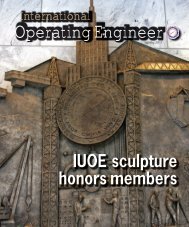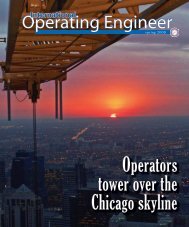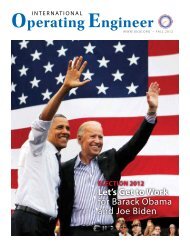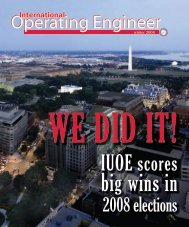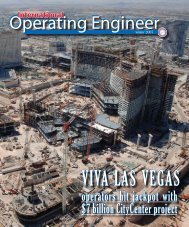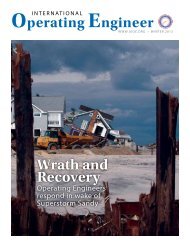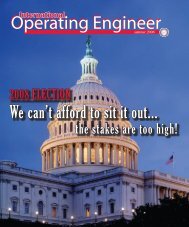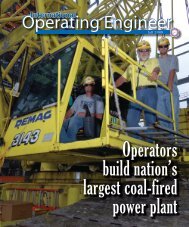Summer 2009 - International Union of Operating Engineers
Summer 2009 - International Union of Operating Engineers
Summer 2009 - International Union of Operating Engineers
You also want an ePaper? Increase the reach of your titles
YUMPU automatically turns print PDFs into web optimized ePapers that Google loves.
An IUOE perspective • General President Vincent J. Giblin<br />
Pension funding relief, financial industry regulation needed<br />
Workers constantly worry about what they are going to do<br />
when their working days are over. And they definitely wear out<br />
the worry beads fretting about whether they will be able to afford<br />
retirement – at least those do who are past their invincible, whatme-worry<br />
youthful years.<br />
Simply put, financial security in retirement is arguably the<br />
greatest concern and most sought-after goal <strong>of</strong> workers, a concern<br />
and a goal that get magnified a thousand-fold as retirement day<br />
nears.<br />
Of course, the best foundation a worker can have to build toward<br />
retirement security is a defined benefit pension plan through<br />
his or her work, the type <strong>of</strong> pension plan many IUOE members<br />
have. The most popular alternative to the defined benefit pension<br />
plan is the 401(k) plan. (The merits <strong>of</strong> the defined benefit plan<br />
compared to a 401(k) plan are discussed in detail in the Central<br />
Pension Fund column on Page 10 <strong>of</strong> this issue.)<br />
The point here is that in ordinary times, a worker with a pension<br />
plan to supplement Social Security benefits and whatever<br />
savings he or she may have would certainly have some degree <strong>of</strong><br />
financial security in retirement.<br />
But, as everyone knows, these are not ordinary times. Mainstays<br />
<strong>of</strong> the corporate world are going belly-up; for other corporations,<br />
cutbacks in work and production have become the norm<br />
rather than the exception; millions <strong>of</strong> jobs have been lost; hundreds<br />
<strong>of</strong> thousands <strong>of</strong> families have lost their homes; government<br />
cash IVs are keeping the messed-up financial world alive; individuals<br />
and organizations have suffered losses ranging from mild<br />
to bad to catastrophic on their savings and investments.<br />
Pension funds are among those organizations that took hits <strong>of</strong><br />
varying degrees on their investments. Unfortunately, a number<br />
<strong>of</strong> pension funds, including some IUOE local union funds, suffered<br />
severe losses because they invested through the now-infamous<br />
Bernard Mad<strong>of</strong>f investment firm. Mad<strong>of</strong>f has admitted to<br />
fleecing investors <strong>of</strong> over $50 billion through a fraudulent Ponzi<br />
scheme.<br />
The bottom line is that the unregulated financial industry,<br />
with its complex (mind-numbing to the casual investor and even<br />
to some experienced pr<strong>of</strong>essionals) trading <strong>of</strong> derivatives and credit<br />
default swaps, brought about this debacle that taxpayers and<br />
investors, including workers and their pension funds, are paying<br />
dearly for now in the form <strong>of</strong> government bailouts and their loss <strong>of</strong><br />
jobs, savings, homes and even families.<br />
The hands-<strong>of</strong>f regulatory approach to the financial industry<br />
must be changed. It is not enough to extend bailouts to these investment<br />
firms and banking institutions just so they can get back<br />
to business as usual. We need enforceable regulation, more transparency<br />
in transactions and reforms to simplify the existing complexity<br />
in order to infuse some stability<br />
into the financial industry.<br />
For far too long, the financial<br />
industry has told legislators, regulators,<br />
investors and mainstream<br />
America that it is too complex an industry<br />
to try to regulate. The industry<br />
has long held that if regulation<br />
was tried, the financial masters <strong>of</strong><br />
the universe would crumble. So no<br />
one tried to regulate it over the past<br />
10 years – and look what happened:<br />
it crumbled and brought down a lot<br />
<strong>of</strong> organizations, funds and individuals<br />
with it.<br />
In addition to restoring common<br />
sense regulation to Wall<br />
Street, Congress must also act to<br />
provide relief to our multiemployer<br />
defined benefit plans that have been<br />
harmed by Wall Street’s unchecked<br />
greed.<br />
‘The hands<strong>of</strong>f<br />
regulatory<br />
approach to<br />
the financial<br />
industry must<br />
be changed.’<br />
It is our multiemployer plans<br />
that have provided retirement security to generations <strong>of</strong> <strong>Operating</strong><br />
<strong>Engineers</strong>. And it is plans like these that have provided the same<br />
security for millions <strong>of</strong> other hand-working Americans. These<br />
plans are the gold standard <strong>of</strong> retirement security, providing a secure<br />
monthly benefit for life, thereby permitting participants to<br />
budget for retirement with a predictable stream <strong>of</strong> income. Even in<br />
hard times, when defined benefit plans are forced to cut the rate at<br />
which future benefits accrue, participants always know what they<br />
have already accrued, what they can expect to accrue in the future,<br />
and can plan for retirement accordingly.<br />
Congress must act to assist our plans in weathering the current<br />
economic storm. The action needed is simple and doesn’t require<br />
a bailout, a stimulus package or a dollar <strong>of</strong> taxpayer money. All<br />
that is needed are limited changes to the current funding rules to<br />
permit plans time to recover from the meltdown in the investment<br />
markets. These changes would extend the period over which recent<br />
investment losses can be amortized, and permit those losses to<br />
be recognized more gradually on an actuarial basis. Such modest<br />
changes will permit our plans to effectively recover from the harm<br />
suffered by the previous lack <strong>of</strong> effective regulation <strong>of</strong> Wall Street.<br />
The IUOE Legislative Dept. already is discussing this necessary<br />
pension funding relief with key congressional staff on committees<br />
with jurisdiction over pensions, such as the House Education<br />
and Labor Committee. Along with other partners in the<br />
multi-employer universe, we will be looking to move legislative<br />
relief at the earliest opportunity in the coming months.<br />
s u m m e r <strong>2009</strong> 3



